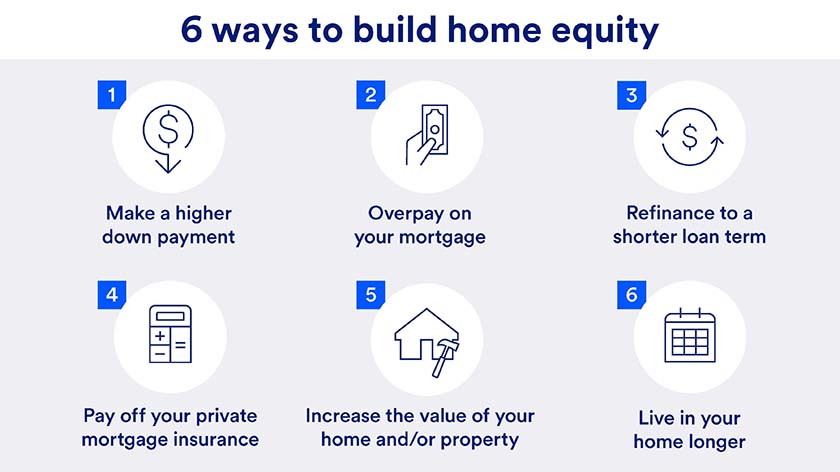
Key takeaways
Home equity is the most powerful way to build generational wealth because you can use those funds to increase your wealth and pass it down to your descendants.
Ways to build home equity include overpaying on your mortgage, refinancing to a shorter loan period, and making a higher down payment.
You can use your home’s equity to increase liquidity by taking out a HELOC, a second mortgage or a cash-out refinance.
Homeownership comes with myriad benefits, such as tax deductions, appreciation, stability and the freedom to decorate your space in a way that reflects your personality. But one of the biggest pros of investing in real estate is the opportunity to build home equity.
Understanding home equity
Home equity is the difference between your home value and your mortgage loan balance. For example, if you have a $750,000 home with a $600,000 mortgage, your equity in the home—the amount you own outright—is $150,000.
Think of it like this: With every monthly mortgage payment you make, you’re putting some of that money back in your pocket—unlike making a rental payment, which only increases your landlord’s equity.
Home equity is a crucial piece of your investment portfolio because it’s a way to create wealth. You can use funds to meet financial goals throughout your lifetime and then pass down that wealth to future generations.
Home equity is a crucial piece of your investment portfolio because it’s a way to create wealth; it’s a forced savings vehicle from which you can use funds to meet financial goals throughout your lifetime and then pass down that wealth to future generations.
How do you build equity in your home?
There are a variety of ways to build equity in your home:
- Make a higher down payment. The typical down payment for first-time homebuyers is 8% of the home’s value, and 23% for repeat buyers, according to the National Association of Realtors (NAR). The more cash you can bring to the closing table, the better, because your down payment is instant equity.
- Overpay on your mortgage: For most home loans, there’s no penalty for paying off your mortgage faster, so if your financial situation allows, pay more than your minimum monthly payment. This extra amount is applied directly to your principal—not the interest—which reduces the amount you owe and builds your equity.
- Refinance to a shorter loan term: If you’ve been overpaying on your 30-year fixed-rate mortgage for a while and still feel financially comfortable, consider refinancing to a 15-year fixed-rate mortgage. While your minimum monthly payments will increase, you’ll build equity faster, because you’re significantly cutting the debt-repayment period.
- Pay off your private mortgage insurance (PMI): When you purchase your home, you may be required to carry private mortgage insurance if your down payment is under a certain percentage (typically 20%, but it depends on your loan servicer). PMI—which, on average, costs 0.46% to 1.50% of your mortgage, according to the Urban Institute's Housing Finance Policy Center—protects the lender from financial loss if you default on your loan. Once you’ve amassed that 20% equity in your home, you can request to have the PMI removed from your loan, lowering the portion of your monthly payment that isn’t going to the principal balance.
- Increase the value of your home and/or property: You don’t need to rely on the market to increase your home’s value. You can sometimes force appreciation by undertaking home renovation projects, especially those with a high return on investment, like bathrooms and kitchens. Run your home improvement ideas by a trusted financial professional, as each market is different, and this is not a guaranteed strategy to increase equity.
- Live in your home longer: There’s no way around it: Moving is expensive, so the longer you can stay in your current home, the more equity you naturally build. At the beginning of your loan, most of your monthly mortgage payment goes toward interest rather than principal, but as you continue to pay down what you owe on your house, you’ll eventually reach a tipping point where you start paying more principal than interest, accelerating home equity growth.
How can you use your home’s equity?
Once you’ve had a chance to build home equity, you can access that money to fund other areas of your life. It can be used for home renovations, paying off high-interest credit cards, a child’s wedding or college education, starting a business, a new car or even a dream vacation. There are three main ways to tap into this equity:
- Home equity loan. Also known as a second mortgage, a home equity loan allows you to borrow money against your home equity, typically up to 80% of your equity. Fixed-interest rates on these loans—which have a specified term length—tend to be lower than other loans because your home is used as collateral.
- Home equity line of credit (HELOC). With a HELOC, you’re extended a line of credit—again, usually up to 80% of your equity—to use on an as-needed basis for a set number of years, known as a draw period. During this time, you only pay interest on the money you borrow, but when the draw period is up, you must repay the principal balance and interest.
- Cash-out refinance. In a cash-out refinance, you take out a new loan on your house for a larger amount than you currently owe (but no more than 80% of your equity). The new loan is used to pay off the initial mortgage, and you get to keep the difference in cash to pay for other life expenses at your discretion.
Though using your home’s equity is the safest way to borrow over other loans or lines of credit, there are pros and cons to each of these strategies, so it’s important to talk through your options with a financial professional.
Building home equity over time
Mortgage interest rates, home values and home equity are all intertwined. When interest rates are high, it’s harder for people to afford homes, so home prices usually drop. On the flip side, when interest rates are low, home prices increase, because there is more demand in the housing market.
What does this mean for building equity? For existing homeowners, equity can fluctuate based on your home’s value. You gain equity if your value goes up but lose equity if the value decreases. This typically isn’t a problem unless you plan to sell or borrow against your home equity in the near future. As stated previously, the longer you live in your home, the more equity you’ll naturally build.
Learn how our team-based planning approach can help you review financial opportunities from all perspectives.
Tags:
Explore more
Should I pay off my mortgage early?
If you have available cash, it could be tempting to pay off your mortgage. But there are other options and factors to consider before making such a big decision.
Our goals-focused approach puts you first.
We can help you identify and prioritize your financial goals and design a plan to work toward them, making adjustments as your needs evolve.



